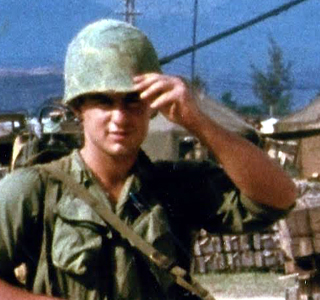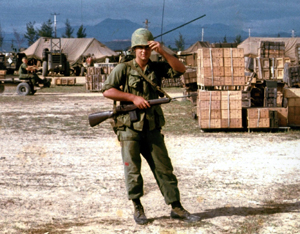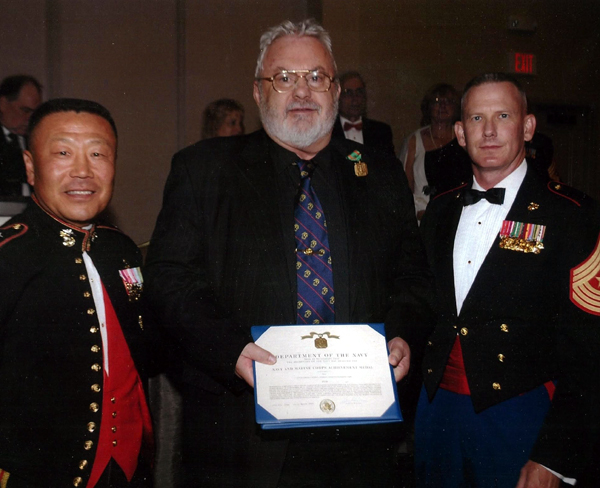|
Jeff Roberts ('64)
Operation Shelbyville At approximately 1500 hrs I/Cpl Robert Jeff Roberts,1st Shore Party Bn.Helicopter Support Team (HST) radioman attached to H & S Co. of 3/5, was informed that there would be an 81 mm mortar mission at approximately 1600 hrs and that I should call in an emergency resupply request for 81 mm mortar rounds. I quickly called in the resupply mission and the resupply helicopters landed at approximately 1545 hrs. The mortar tube was readied and its rounds were staged beside it. I believe the mortar mission was for one of the companies, possibly KILO, to enter the tree line and then proceed away from our present position which was on the bank of the Song Be River. The mortar mission's possible intent was that the mortar rounds were to be fired up, over and ahead of KILO Company to a safe position down the trail that they would be traveling so the rounds could possibly clear out any ambushes or snipers. At approximately 1600 hrs I had positioned myself approximately eight yards from the mortar tube. I always liked to stand fairly close to any mortar tube during a mortar mission, either a 81mm or a 60 mm, because after the round is dropped, my eyes would be able to follow it as it leaves the tube, heading upward on its path towards its designated attitude and continue to watch it as it turns downward on its new path towards its predetermined landing zone. However, this mortar mission would be like no other one that I had ever witnessed before. After watching four rounds successfully leave the tube, the fifth round, when it came out of the tube, made an odd sound. It made an intermittent whooshing sound that immediately alerted the experienced mortar men that it was going to be a short round. My immediate actions, after hearing the sound of the short round being announced, were motivated by not only my marine training that I had received prior to coming to Vietnam, but also the on the job self-training that I had developed in honing my skills as a radioman in coordinating as many as 34 previous medivacs over a span of 8 combat operations, many of them being extremely difficult and challenging. I also had two qualities that one cannot get from training that I believed not only helped me perfect my skills in performing those medivacs but had many times helped save my life: extremely quick reflexes and the ability to think very fast and also make quick decisions under the duress of combat. As the round was leaving the tube and the sound of a short round was being announced, I noticed that just about everyone was launching themselves to the ground facedown, their hands instinctively going to the backs of their heads. I kept standing, while I continued to watch the short round. As it sometimes was for me in combat, everything seemed to be happening in slow motion. As the round was in its halfway point of its journey downward, I quickly realized that its destination could possibly be close to KILO Company. What immediately followed was an explosion causing a sight that I shall never forget. The short 81 mm mortar round had appeared to land in the middle of Kilo Co.
When I arrived, I noticed that there were two KIAs who had been covered with ponchos and also what appeared to be several WIAs who were being treated by the corpsman. Next, after I had selected my LZ, I could hear that the helicopters were close. I looked up and realized that they were fast approaching so I threw a smoke grenade into the LZ. Then I immediately realized that I needed to go to where the corpsman was working on the WIAs, so that I could write down in my mission book all of the information that I needed to give to the pilots, in other words, how many KIAs and WIAs as well as the status of the WIAs. After immediately receiving the information I spun around and ran back to the LZ, getting there just in time to help them land one behind the other. The average time for most of my medivacs during previous operations was approximately 20 to 30 minutes. A fast medivac would have been 15 to 20 minutes. After I had landed the two medivac helicopters, I looked at my watch and felt total disbelief. Between the time of the impact of the short round and when the two helicopters' wheels had touched down was five minutes. I was on the radio talking to the pilot of the first helicopter, giving him the information on the five WIA, when I looked over and saw that the corpsman was still working on them. I began to get concerned that the helicopters would be on the ground too long and that they might get the att.ention of a sniper or something worse like getting mortared. So I quickly decided to load the two KIAs on to the first helicopter. I approached the first KIA who appeared to be lying on his back with his right arm extended out from under the poncho. His arm was bent at the elbow with his forearm and open hand reaching upward toward the sky. I pulled the poncho off of him, spreading it open beside him. Some of his fellow marines approached and helped me pick him up and place him onto the poncho and we carried him over and put him onto the first helicopter. I then went to the second KIA. As I approached the poncho covered marine, I could see that the mortar round's impact area was right beside him. When I pulled the poncho off of him and spread it out beside him, it was as though most of the marines were seeing what happened to him for the first time. By then the corpsman was finished treating the WIAs and Lieutenant Colonel Rockey had restored order. With the help of some marines, I was able to load the WIAs onto the second helicopter and then direct the helicopters safely out of the LZ. After the second helicopter had lifted up from the LZ and was turning towards Danang, I glanced at my watch and immediately realized that the total time of the medivac from the explosion to the helicopters taking off was 8 minutes. Even with what had just happened, I have always wanted the opportunity to be able to thank Colonel Rockey, for the time, immediately after the medivac, when he came up to me and told me, "Job well done, marine". "I'm going to put you in for an achievement medal."
|

 (Warning: this article contains graphic descriptions of armed conflict and war injuries)
(Warning: this article contains graphic descriptions of armed conflict and war injuries) With the impact of the explosion I saw something large and indistinguishable fly upwards and to the left. Then immediately after hearing the dreaded, "Corpsman up!" I instinctively turned my head to the right towards where l had my radio set up. As I was running over to get my radio, so that I could start the medivac process, I noticed two UH-340 Helicopters, approximately five klicks out, heading towards Danang. Something was telling me that they were finished with their mission and were probably heading back to base. Then believing that I needed to inform Lt/Colonel Rockey of my plan and to get his permission, I turned to the right where he was standing and told him of my plan. He then ordered me to carry on with the plan. I then contacted air control, who I believe their call sign was Blackwatch or Blackcoat, telling them that I had an emergency medivac and was it possible for me to be able to use the two 34s that I saw heading back in the direction of Danang. They told me to "wait one," then after 15 seconds they called me back and told me that it was a go and gave me their radio frequency and call sign. I immediately called the helicopters and after the pilots said that they would help, I turned them around so they were headed in my direction. I picked up my radio and ran to where the mortar round had landed.
With the impact of the explosion I saw something large and indistinguishable fly upwards and to the left. Then immediately after hearing the dreaded, "Corpsman up!" I instinctively turned my head to the right towards where l had my radio set up. As I was running over to get my radio, so that I could start the medivac process, I noticed two UH-340 Helicopters, approximately five klicks out, heading towards Danang. Something was telling me that they were finished with their mission and were probably heading back to base. Then believing that I needed to inform Lt/Colonel Rockey of my plan and to get his permission, I turned to the right where he was standing and told him of my plan. He then ordered me to carry on with the plan. I then contacted air control, who I believe their call sign was Blackwatch or Blackcoat, telling them that I had an emergency medivac and was it possible for me to be able to use the two 34s that I saw heading back in the direction of Danang. They told me to "wait one," then after 15 seconds they called me back and told me that it was a go and gave me their radio frequency and call sign. I immediately called the helicopters and after the pilots said that they would help, I turned them around so they were headed in my direction. I picked up my radio and ran to where the mortar round had landed.